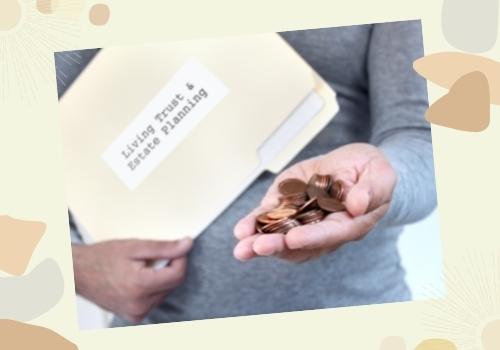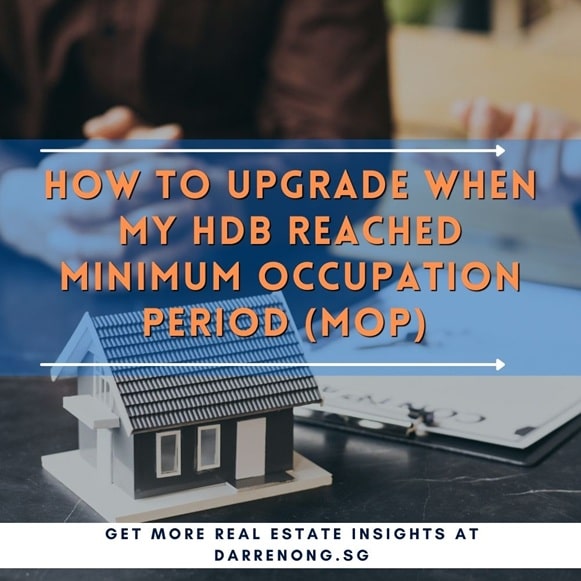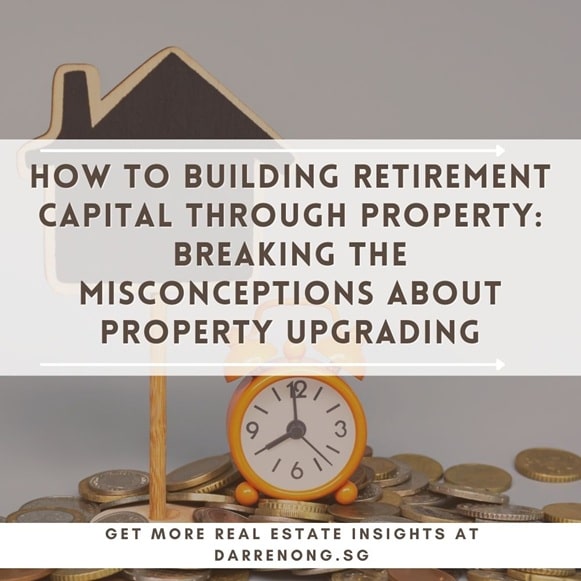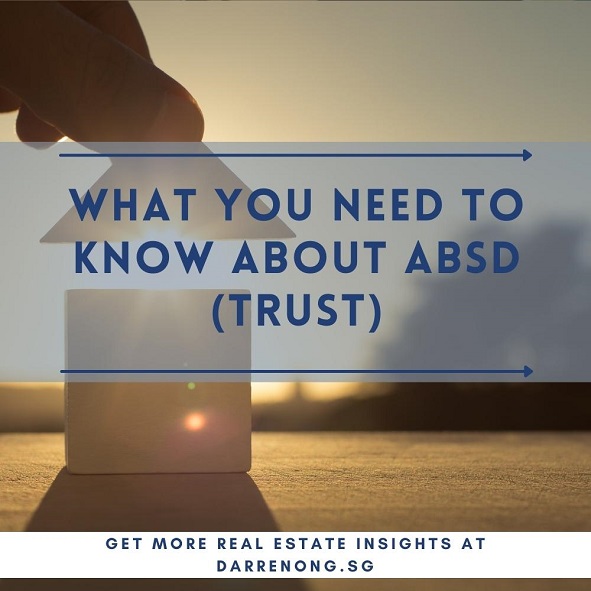Table of Contents
What You Need To Know About ABSD (Trust)
On Sunday, 8 May 2022, 11.30 pm, The Ministry of Finance (MOF) first announced an Additional Buyer’s Stamp Duty (ABSD) of 35% is payable to any transfer of residential property by way of a living trust with effect from 9 May 2022. This is after the last property cooling measures were announced late at night on 15 Dec 2021, when the ABSD was raised from 12% to 17% for purchasing a second property.
On Wed, 26 April 2023, the government announced 2nd round of cooling measure for Trustee6 buying any residential property1. The ABSD (Trust) will be further increased from 35% to 65% with effect from 27 April 2023.
In addition, the MOF also announced additional conveyance duties (ACD) on 9 May 2022, which will apply to the transfers of equity interests in property-holding entities (PHEs) into trusts.
Both the ABSD (Trust) and ACD will apply even if there is no identifiable beneficial owner at the transfer into the Trust.

What is a Living Trust?
What do we need to know before 9 May 2022?
ABSD was previously not applicable with no identifiable beneficial owner when transferring into a trust.
In short, before 9 May 2022, There is no need to pay ABSD when purchasing a property under Trust.
The first thing that may come into your mind is that the government is trying to plug a loophole in buying residential properties under Trust because some families buy properties under trust structures for some reasons, but mainly, it was driven to avoid ABSD or to pay lower ABSD rate legitimately.
In such a trust structure, the parent or grandparent will buy the property for the benefit of a child or grandchild who is likely to be a minor under the age of 21 who does not own a residential property, where the bank could not grant the mortgage loan. Therefore, the trustee will need to buy the property in cash and irrevocably give the money to the beneficiary.
What do we need to know after 9 May 2022?
Starting from 9 May 2022, the new ABSD (Trust) is payable upfront when transferring the residential property into any living trust. The trustee may then apply to the Inland Revenue Authority of Singapore (IRAS) for a refund of the new ABSD if it fulfilled the conditions set by the new rules. The refund applications should be submitted to IRAS within six months after executing the instrument.
The conditions to apply for the ABSD (Trust) refund are as follows:
- The name of the beneficiary must be in the trust deed.
- The beneficial ownership (BO) must be vested to the beneficiary pursuant to the trust deed.
- The beneficial ownership cannot be revoked, varied, or subject to conditions subsequent under the terms of the Trust.
There will be NO REFUND where the beneficial ownership:
- is not vested at the time of the creation of Trust.
- can be revoked under the terms of the Trust.
- can be varied under the terms of the Trust.
- is contingent, which means it is vested only if and when an event is triggered.
- is deferred, which means it is to be vested in the future.
There will be NO REFUND where the beneficiary:
- is unborn on the date of the trust deed.
- is only entitled to the income of the property under the Trust.
- Has discretionary interest is not fixed entitlement or interest where the trustee can exercise discretion.
- Is entitled to the property only upon revocation of Trust.

Example 1:
Example 1:
What is the date of document for the purposes of stamp duty?
For the purposes of stamp duty, the date of document of the purchase instrument will be taken as the date on which the document is signed (i.e. the Acceptance to Option to Purchase/Sale and Purchase Agreement should be signed on the date it is to be executed and delivered to the Vendor). The trust instrument should also be signed, sealed and delivered on the day it is to be executed.
Example 2:
Example 2:
You executed an Acceptance of the Option to Purchase (OTP) on 1st Aug 2023 to buy a property on Trust for your Singapore Citizen mother, who currently also owns one other residential property. You also executed a declaration of Trust to state that you are holding the property in Trust for your mother, who is the sole beneficial owner of this trust property. If the beneficial ownership has vested in your mother, and there are no other provisions in the Trust to revoke, amend, or subject your mother’s beneficial ownership in the trust property to any conditions. Will you be eligible for remission of ABSD (Trust)?
The answer is
ABSD (Trust) of 65% is payable as the property was purchased on trust for your mother. You will need to make upfront payment of ABSD (Trust) before making a remission application where IRAS will assess whether the refund conditions are met.
For this case, if you apply within the deadline with the necessary supporting documents, you will be eligible for remission of the difference between the ABSD (Trust) amount paid and the ABSD payable had your mother purchased the property directly in her name. As this is the second residential property owned by your mother, the total amount of ABSD refunded will be 45% (being 65% – 20%).
Example 3:
Example 3:
You have applied for the remission of ABSD (Trust) to IRAS. What is the processing time, and when can I expect to receive the refund if my application is approved?
The answer from IRAS is that most applications will be processed within two months from the date of complete information being submitted to IRAS. Where IRAS has approved the application, the refund will be made within one month after approval.
Example 4:
Example 4:
You executed an Acceptance to the Option to Purchase (OTP) on 30 April 2023 to buy landed property on trust for your Son (Singapore Citizen ). This is his first residential property. You had also executed a declaration of the trust to state that you are holding the property in trust for your son, the sole beneficial owner of this trust property. If the beneficial ownership has vested in your son, and there are no other provisions in the trust to amend, revoke, or subject your son’s beneficial ownership in the trust property to any conditions. Will you be eligible for remission of ABSD (Trust)?
The answer is that the ABSD (Trust) of 65% is payable as the property was purchased on trust for your son. You will need to make upfront payment of ABSD (Trust) before making a remission application where IRAS will assess whether the refund conditions are met.
For this case, if you apply within the remission deadline with the necessary supporting documents, you will be eligible for remission of the difference between the ABSD (Trust) amount paid and the ABSD payable had your son purchased the property directly in his name. As this is the first residential property owned by your son, the total amount of ABSD refunded will be the full 65% ABSD that had been paid earlier.
Example 5:
Example 5:
You executed a declaration of Trust on 1st June 2023 to declare that you are holding a condominium on Trust for your two children, Lily and Xavier. The Trust states that Lily beneficially owns a 50% share of the condominium, while Xavier is only entitled to the other 50% should he graduates from his Master Degree. You paid the ABSD (Trust) 65% when executing the Trust declaration. Will you be eligible for remission of ABSD (Trust)?
The answer is No because you will not be eligible for the ABSD (Trust) remission. One of the conditions for such remission is that the beneficial owners of the trust property consist of identifiable individual beneficiaries only. As Xavier’s interest in the property is contingent on his graduation from the Master Degree, thus he is considered not an identifiable individual beneficiary, and hence this condition is not fulfilled. As such, no remission will be granted.
Example 6:
Example 6:
You executed an Acceptance to the Option to Purchase (OTP) on 1 Jul 2023 to buy a condominium. Then you execute a declaration of The Trust to declare that you are holding the condominium on Trust for your child. Can you submit an application for upfront remission instead of paying 65% ABSD and then obtaining a refund?
The answer is No because it is one of the conditions under the Stamp Duties (Trusts for Identifiable Individual Beneficiary) – (Remission of ABSD) Rules 2022, where the ABSD is chargeable on the instrument has to be paid before any remission application and ABSD remission can be granted.
As such, IRAS is unable to grant the remission of ABSD before ABSD (Trust) is paid.
Please stamp the instrument within 14 days after you execute the document if it is executed in Singapore or, if first executed outside Singapore, within 30 days after it has been received in Singapore, and make payment before the due date to avoid incurring late stamping penalties.
Example 7:
Example 7:
Suppose you intend to execute a Will stating that your residential property will be held in Trust for your child upon your death. Will this Trust be subject to the ABSD (Trust) of 65%?
The answer is ABSD (Trust) applies to the transfer of any residential property into a living trust on or after 9 May 2022. A living trust is defined as one created by a person (the settlor) within his or her lifetime, and it does not include a testamentary trust (i.e., a trust made using a Will, and that takes effect after the death of the settlor).
As the Trust in this scenario is considered a testamentary trust, ABSD (Trust) does not apply.
Example 8:
Example 8:
You have executed a declaration of trust on 15th Sept 2023 to declare that you are holding a landed property on trust for your son whose beneficial interest in the property will only vest at the age of 25. Will you be eligible for the remission of ABSD (Trust)?
The answer is No because the remission condition is based on vested beneficial ownership at the time the property is transferred into the trust. Deferred beneficial ownership that would only vest in the future will not meet the condition for ABSD (Trust) remission.
In Summary,
With effect from 9 May 2022, ABSD (Trust) of 35% is payable upfront and it is further increased to 65% on 27 April 2023, even if there is no identifiable beneficial owners when transferring the residential property into any living trust. The trustee may then apply to the Inland Revenue Authority of Singapore (IRAS) for a refund of the new ABSD if it fulfilled the following conditions:
- All the beneficial owners stated in the Trust of the residential property must be identifiable individuals;
- The beneficial ownership of the residential property in the Trust has vested in all of these beneficial owners when the property is transfer into the Trust.
- The beneficial ownership stated in the Trust cannot be varied, or revoked or be subjected to condition.
As of 27 April 2023, the ABSD refund amount is the difference between the 65% ABSD (Trust) rate and the ABSD rate corresponding to the individual profile of the beneficial owner with the highest applicable ABSD rate. The remission application for the refund must be made to IRAS within six months after t he instrument is executed.
I hope the above explanation clears any of your doubts and if you are planning to purchase property and would like to work out the best possible way to execute and restructure the property portfolio. Do feel free to reach out to me for a short non-obligatory discussion.
ABSD is to be rounded down to the nearest dollar, subject to a minimum duty of $1.
1 Whether owned wholly, partially or jointly with others.
6 Trustee refers to a trustee of any trust when acting in that capacity, but excludes the following:
- Trustee for a collective investment scheme when acting in that capacity;
- Trustee-manager for a business trust when acting in that capacity; and
- Trustee for a housing developer when acting in that capacity.
Need Real Estate Consultation?
Contact Me
Feel free to connect with me!
Senior Associate District Director
Huttons Asia Pte Ltd
CEA Registration No.: R026434F
Agency License: L3008899K
Contact: 93839588

Buying a Property in Singapore? 8 Key Tips on What to Look Out For
What to look out for when buying a condo or property in Singapore? Learn 8 key tips to help you choose or spot the right property for investment or own stay with capital appreciation and exit strategy.

Is It Still Safe to Enter the Property Market In 2025 Amid U.S. Tariffs?
How Trump’s Tariffs Could Affect Singapore’s Condo And HDB Prices. Is it safe to enter the Singapore property market in 2025 amid recession fears and U.S. tariffs? Learn how interest rates, supply trends, and market resilience could shape your next move.

How to Upgrade When My HDB Reached Minimum Occupation Period (MOP)
For HDB owners who have fulfilled the 5-year MOP (Minimum Occupation Period) in Singapore, discover your next move. Find out if you should sell your flat (resale HDB) or upgrade to a private property, with clear tips for smart homeownership planning.

Freehold Vs Leasehold Properties, Which Suit You Best?
Explore the key differences between freehold and leasehold properties in Singapore. Understand their advantages, investment potential, and determine which property type aligns with your goals.

How Much Do You Need to Earn to Afford a Condo in Singapore?
How much salary do you need to buy a condo in Singapore? Calculate loan, cash, CPF needed & avoid costly mistakes. Read the full guide now!

How To Building Retirement Capital Through Property: Breaking the Misconceptions About Property Upgrading
Looking to grow your retirement capital in Singapore? Discover how smart property upgrading and strategic investments can accelerate your wealth-building journey. From first-time buyers to seasoned homeowners, learn how to leverage property for long-term financial freedom.




